Eco-conscious accommodations in Tuscany provide travelers with sustainable options that enhance local experiences and promote health. These lodgings emphasize renewable energy, local sourcing, and waste reduction. Guests benefit from authentic cultural interactions and improved air quality. Diverse accommodations, from agriturismos to eco-hotels, showcase unique practices and face challenges in sustainability efforts.
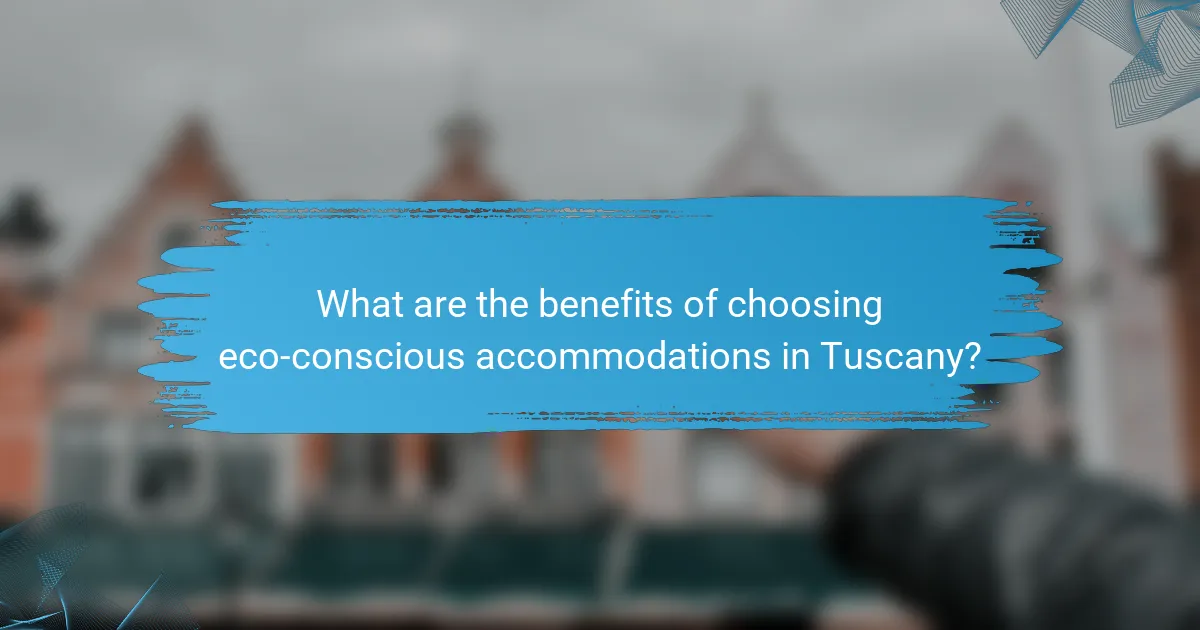
What are the benefits of choosing eco-conscious accommodations in Tuscany?
Choosing eco-conscious accommodations in Tuscany offers numerous benefits, including environmental sustainability, enhanced local experiences, and health advantages. These accommodations often utilize renewable energy sources, reduce waste, and promote biodiversity. Guests enjoy authentic interactions with local culture and cuisine, which supports the regional economy. Additionally, eco-friendly practices lead to improved air quality and reduced carbon footprints, contributing to overall well-being. By opting for these stays, travelers actively participate in preserving Tuscany’s natural beauty and cultural heritage.
How do eco-friendly practices enhance guest experiences?
Eco-friendly practices significantly enhance guest experiences by promoting sustainability and well-being. Guests appreciate accommodations that prioritize environmental responsibility, leading to a more memorable stay.
Sustainable practices in Tuscany include using local materials, reducing waste, and conserving energy. These features create a unique atmosphere that connects guests with the region’s natural beauty. Eco-conscious accommodations often offer organic food options, enhancing the dining experience while supporting local farmers.
Additionally, engaging in eco-friendly activities like guided nature walks or workshops on sustainable living fosters a sense of community among guests. This unique attribute creates lasting memories and encourages repeat visits. Overall, eco-friendly practices align with guests’ values, enhancing their overall satisfaction and connection to the destination.
Which environmental impacts are mitigated by sustainable lodging?
Sustainable lodging mitigates several environmental impacts, including carbon emissions, waste generation, and resource depletion. Eco-conscious accommodations in Tuscany often utilize renewable energy sources, promote local biodiversity, and implement water conservation measures. These practices contribute to reducing the overall ecological footprint of tourism in the region. For instance, many lodgings prioritize sustainable materials in construction and encourage guests to engage in environmentally friendly activities.

What features define eco-conscious accommodations in Tuscany?
Eco-conscious accommodations in Tuscany prioritize sustainability through features like energy efficiency, local sourcing, and waste reduction. These lodgings often utilize renewable energy sources, such as solar panels, and implement water-saving technologies. They focus on using organic and locally produced materials, promoting regional artisans, and offering farm-to-table dining experiences. Many also engage in community initiatives, enhancing local biodiversity and supporting conservation efforts.
How are renewable energy sources utilized in these establishments?
Renewable energy sources are extensively utilized in eco-conscious accommodations in Tuscany through solar panels, wind turbines, and geothermal systems. These establishments harness solar energy for electricity and heating, while wind energy supplements power needs. Geothermal systems provide efficient heating and cooling, reducing reliance on fossil fuels. Many accommodations also implement energy-efficient appliances and smart systems to optimize energy consumption, enhancing their sustainability efforts.
What role does local sourcing play in eco-friendly hospitality?
Local sourcing significantly enhances eco-friendly hospitality by reducing carbon footprints and supporting local economies. It promotes fresh, seasonal ingredients, contributing to sustainable practices. Eco-conscious accommodations in Tuscany utilize local farms, ensuring quality while minimizing transportation emissions. This approach fosters community relationships and encourages biodiversity, making it a unique attribute of sustainable tourism.
Which design elements promote sustainability in accommodations?
Design elements that promote sustainability in accommodations include energy-efficient systems, eco-friendly materials, and water conservation features. These elements reduce environmental impact and enhance guest experiences. For instance, solar panels and LED lighting lower energy consumption. Rainwater harvesting systems minimize water usage. Green roofs improve insulation and biodiversity. Sustainable furnishings made from recycled or locally sourced materials further support eco-conscious practices.
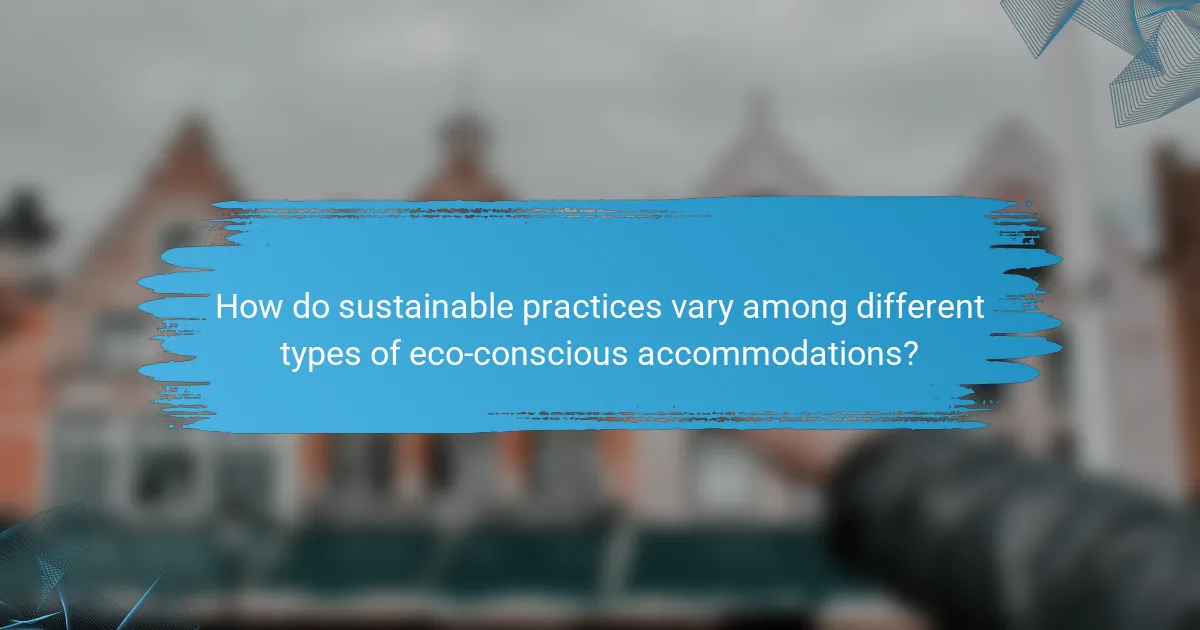
How do sustainable practices vary among different types of eco-conscious accommodations?
Sustainable practices among eco-conscious accommodations in Tuscany vary based on their unique attributes and operational models. For instance, agriturismos often incorporate organic farming, while boutique hotels might focus on energy efficiency and local sourcing.
1. Agriturismos: These accommodations typically practice sustainable agriculture, offering farm-to-table dining experiences and promoting biodiversity on their properties.
2. Eco-hotels: Many eco-hotels utilize renewable energy sources and implement water conservation measures, enhancing their sustainability credentials.
3. Hostels: Some eco-friendly hostels adopt minimalistic designs and encourage shared resources to reduce waste and energy consumption.
4. Bed and breakfasts: These often emphasize local culture and products, supporting nearby artisans and farms, which fosters community sustainability.
5. Glamping sites: Glamping accommodations may focus on low-impact structures and eco-friendly amenities, appealing to environmentally conscious travelers.
6. Villas: Luxury villas may integrate smart technology for energy management and prioritize sustainable landscaping practices.
These diverse approaches reflect the varying degrees of commitment to sustainability within Tuscany’s eco-conscious accommodation sector.
What are the unique attributes of agriturismos in promoting sustainability?
Agriturismos uniquely promote sustainability through their integration of local farming practices and eco-friendly accommodations. They utilize organic farming methods, reducing chemical use and enhancing biodiversity. Many agriturismos source food locally, minimizing transportation emissions and supporting regional economies. Their designs often include renewable energy systems, such as solar panels, which lower carbon footprints. Additionally, they provide educational experiences that raise awareness about sustainable living and environmental stewardship.
How do boutique hotels implement eco-friendly initiatives?
Boutique hotels implement eco-friendly initiatives by integrating sustainable practices into their operations. They often use renewable energy sources, such as solar panels, to reduce carbon footprints. Water conservation systems, like rainwater harvesting and low-flow fixtures, minimize water usage.
Additionally, many boutique hotels prioritize locally sourced food, supporting regional farmers and reducing transportation emissions. Eco-friendly materials are used in construction and decor, ensuring minimal environmental impact. Guest education on sustainability practices further enhances their eco-conscious approach.
These initiatives not only benefit the environment but also attract eco-aware travelers seeking responsible accommodations.
What practices are common in eco-lodges that differentiate them from traditional hotels?
Eco-lodges prioritize sustainability through practices that significantly differ from traditional hotels. They often utilize renewable energy sources, such as solar or wind power, reducing their carbon footprint. Many eco-lodges focus on local sourcing for food, promoting regional agriculture and minimizing transportation emissions. Water conservation techniques, such as rainwater harvesting and low-flow fixtures, are common. Additionally, eco-lodges frequently incorporate natural building materials and design features that blend with the environment, enhancing the guest experience while preserving local ecosystems. These practices reflect a commitment to environmental stewardship and community support.
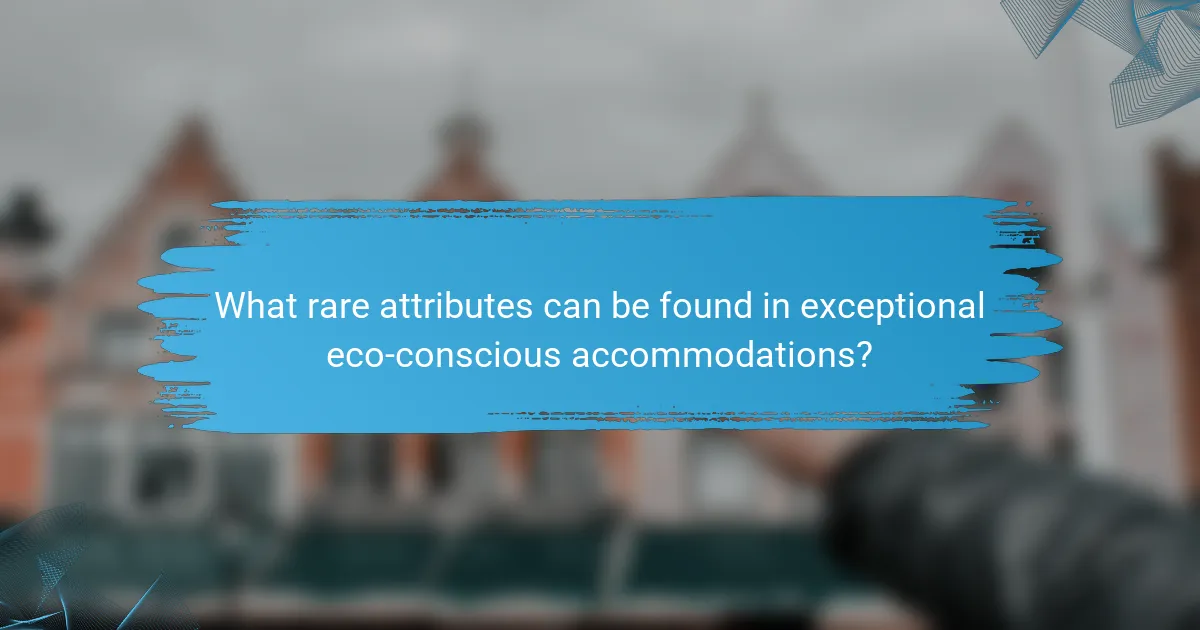
What rare attributes can be found in exceptional eco-conscious accommodations?
Exceptional eco-conscious accommodations in Tuscany often feature rare attributes such as unique architectural designs using local materials, integration of renewable energy sources, and immersive experiences with local ecosystems. These properties may also offer organic culinary experiences sourced from on-site gardens, bespoke wellness programs emphasizing natural healing, and partnerships with local artisans for sustainable craftsmanship.
Which innovative technologies are being adopted in leading eco-friendly properties?
Leading eco-friendly properties in Tuscany are adopting innovative technologies such as solar energy systems, rainwater harvesting, and smart building management. These technologies enhance sustainability by reducing energy consumption and minimizing waste. For instance, solar panels can generate significant energy savings, while rainwater systems can reduce water usage by up to 50%. Additionally, smart technologies enable efficient resource management, optimizing energy use throughout the property.
How do some accommodations engage in community-driven sustainability efforts?
Eco-conscious accommodations in Tuscany engage in community-driven sustainability efforts by collaborating with local organizations and promoting environmental awareness. These accommodations often participate in initiatives like waste reduction, local sourcing of food, and conservation programs. They may host workshops to educate guests on sustainable practices. Additionally, many utilize renewable energy sources and implement eco-friendly building materials, enhancing their overall sustainability profile. These efforts not only benefit the environment but also foster community relationships, supporting local economies and preserving cultural heritage.
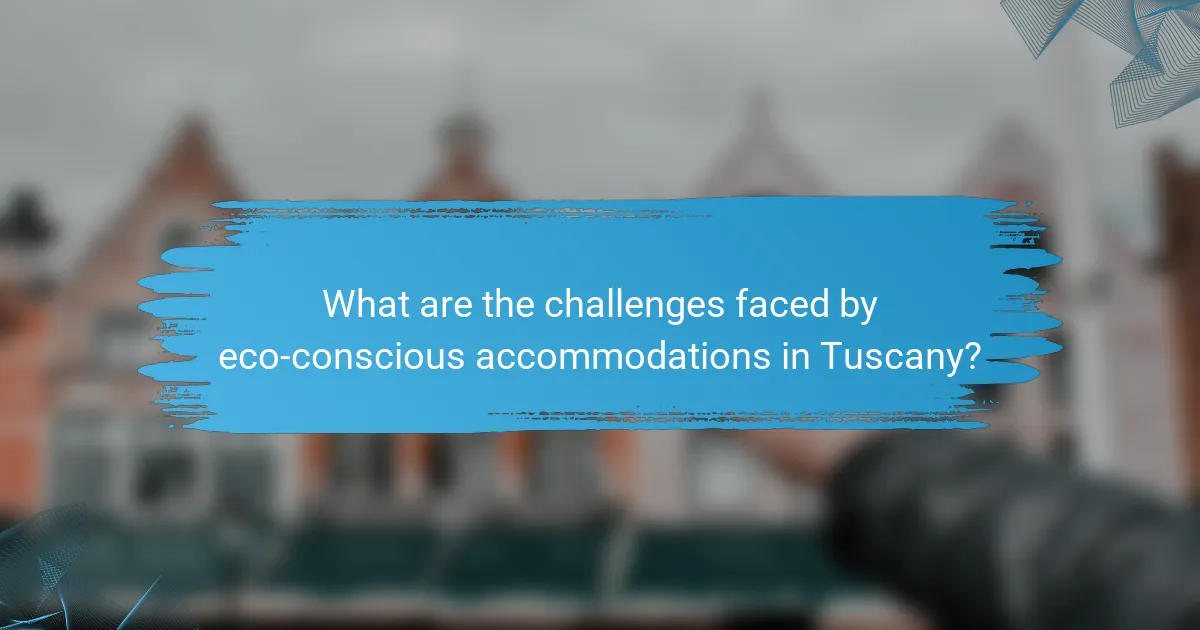
What are the challenges faced by eco-conscious accommodations in Tuscany?
Eco-conscious accommodations in Tuscany face challenges such as high operational costs, regulatory compliance, and limited access to sustainable resources. These factors can hinder their ability to implement eco-friendly practices effectively. Additionally, attracting environmentally conscious travelers in a competitive market presents difficulties.
How do regulations impact sustainable practices in the hospitality sector?
Regulations significantly enhance sustainable practices in the hospitality sector by enforcing eco-friendly standards. Compliance with these regulations encourages hotels to adopt energy-efficient systems and waste reduction strategies. For instance, Tuscany’s eco-conscious accommodations often implement solar energy solutions and water conservation methods due to regulatory incentives. These practices not only reduce environmental impact but also attract environmentally aware travelers, ultimately benefiting the local economy and ecosystem.
What barriers do guests face when choosing eco-friendly options?
Guests face several barriers when choosing eco-friendly options. Limited awareness of sustainable practices in accommodations often deters guests. Higher costs associated with eco-conscious options can also be a significant factor. Additionally, guests may struggle with the availability of such accommodations in their desired locations. Misconceptions about the quality and comfort of eco-friendly stays further complicate their choices. Lastly, lack of clear labeling and certification for sustainable practices can create confusion among potential guests.
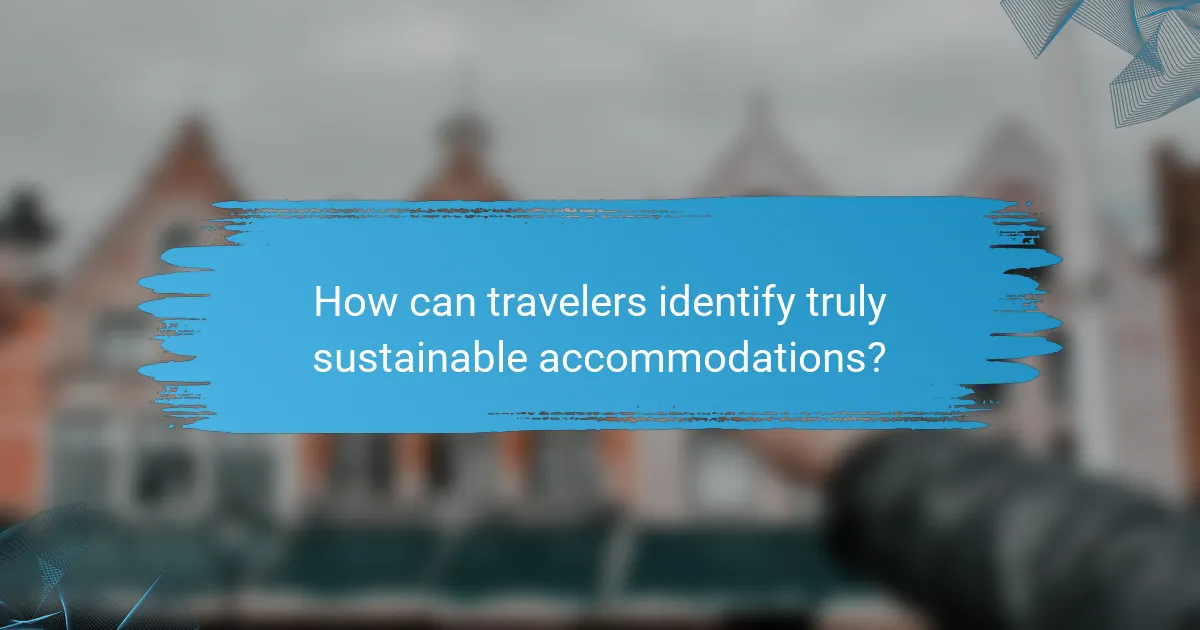
How can travelers identify truly sustainable accommodations?
Travelers can identify truly sustainable accommodations by assessing their eco-friendly practices, certifications, and community engagement. Look for features like renewable energy use, water conservation measures, and locally sourced materials.
Many eco-conscious accommodations in Tuscany adopt practices such as organic gardening, waste reduction strategies, and support for local artisans. Certifications like Green Key or EarthCheck indicate a commitment to sustainability.
Additionally, reading guest reviews can provide insights into the authenticity of their claims. Engaging with hosts about their sustainability efforts can further clarify their practices and dedication to eco-conscious hospitality.
What certifications should guests look for in eco-conscious lodging?
Guests should look for certifications such as Green Key, Eco-Label, and LEED when choosing eco-conscious lodging. These certifications indicate adherence to sustainable practices and environmental responsibility. Green Key focuses on energy efficiency and waste reduction, while Eco-Label emphasizes eco-friendly products. LEED certification demonstrates a commitment to sustainable building design and operation. Recognizing these certifications helps ensure a genuine eco-conscious experience in Tuscany’s accommodations.
Which resources can assist travelers in finding sustainable options?
Travelers can utilize various resources to discover eco-conscious accommodations in Tuscany. Websites like EcoBnB and Green Key provide listings of sustainable hotels and lodgings. Additionally, platforms such as Airbnb now feature eco-friendly filters to help users find green stays. Local tourism boards often promote sustainable practices and offer guides on eco-friendly options. Reviews on travel forums and social media can also highlight accommodations that prioritize sustainability.

What best practices should travelers follow when staying at eco-conscious accommodations?
Travelers should prioritize sustainability, local culture, and minimal environmental impact when staying at eco-conscious accommodations.
1. Research the property’s sustainability practices, such as energy efficiency and waste management.
2. Choose accommodations that support local businesses and communities.
3. Use eco-friendly transportation options to reach your destination and explore the area.
4. Minimize water and energy use during your stay by reusing towels and turning off lights.
5. Participate in local conservation efforts or community activities offered by the accommodation.
How can guests minimize their environmental footprint during their stay?
Guests can minimize their environmental footprint during their stay by choosing eco-conscious accommodations in Tuscany. These establishments often implement sustainable practices such as energy-efficient systems, water conservation measures, and the use of local, organic products.
Additionally, guests can participate in recycling programs, utilize public transportation, and support local businesses. Engaging in these practices not only reduces waste but also enhances the overall experience by connecting visitors with the region’s culture and environment.
Staying in eco-friendly lodgings often includes benefits like reduced carbon emissions and improved air quality. Many Tuscan accommodations also promote biodiversity through responsible landscaping and organic farming.
What common mistakes should travelers avoid when choosing eco-friendly lodging?
Travelers should avoid overlooking certifications, ignoring location impacts, and neglecting reviews when choosing eco-friendly lodging. These mistakes can lead to subpar experiences and undermine sustainability efforts.
First, check for recognized eco-certifications like Green Key or EarthCheck, which ensure genuine sustainable practices. Second, consider how the lodging’s location affects local ecosystems; avoid places that harm wildlife or natural resources. Lastly, read guest reviews to gauge the authenticity of eco-friendly claims, as some accommodations may exaggerate their sustainability efforts.